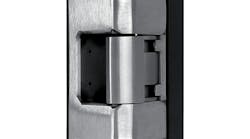Funny how we talk about the future of security, like it’s far off, like the Jetsons (yes, I am aging myself), where everything is fully automated in the home, office, and cities, but the truth is we already have the technology to make it all happen. Now, it’s just a matter of how it will all come together, which credentials and technologies will stand the test of time and are preferred, such as biometrics or mobile, or a combination, for example.
With the proper setup we can now use our phones – the most prevalent credential today – to control everything in our home and office. So, imagine our car unlocks and starts itself as we approach (even drives itself), our office or shop lights come on as we drive up, the front door unlocks as you approach, blinds open, music starts playing … you get the picture, full automation.
What I love about all the technology that exists today to make all this automation possible is that there is still one piece in this magnificent puzzle that hasn’t – and won’t ever – go away: the door lock. Yes, I can hear locksmiths everywhere breathing a sigh of relief at the thought that the standard deadbolt lock, whether it’s electronic and communicating with your phone and the cloud, still needs to be installed and working properly or this whole automation house of smart cards comes tumbling down.
“They just don't know how it works on the mechanical side of things, that's where the mechanical locksmith has the advantage because the average homeowner and the average millennial right now does not know how the lock works,” says John Nolan, owner, Reliant Security, based in Grand Junction, Colo., in my article looking at current access control trends for locksmiths (page 10).
Nolan is astute to point out that locksmiths are in a good position to save the day when everything goes wrong, especially with the DIY movement in full tilt, and homeowners and small business owners trying to install locks and systems themselves. For locksmiths and security professionals who are worried that DIY is taking a piece of their pie, Nolan says not to worry, because eventually they are going to need the help of a trained security professional.
“So, on the products, when they put it in and it doesn't work because they watched all the videos, but they just didn't know this extra little thing that you have to do, or they hooked the wires up backwards, or did something wrong because they're not experienced and don’t have the training. That's where your advantage comes in. Now you can come in and do repairs.”
Yes, exactly, which is why Nolan encourages locksmiths to try and be as well-rounded a security professional as possible, being that trusted resource and advisor to customers no matter what point they are in the process. That may mean stepping outside your comfort zone, getting additional training in a certain area, or even adding a high-tech pro to your team; it will pay dividends, says Nolan.




